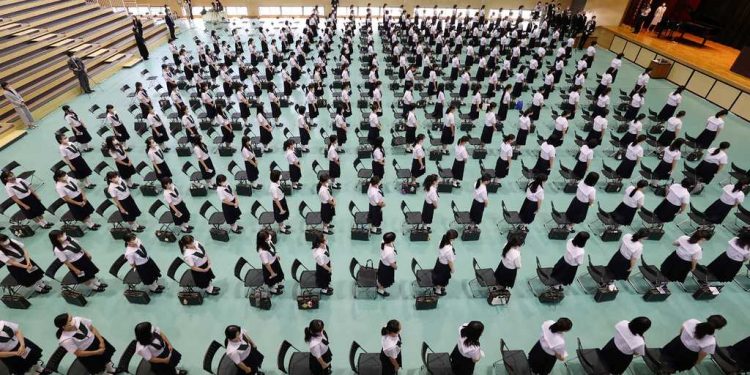The battle to change the rules has been reignited by a court ruling in the western city of Osaka last month that awarded a former student $3,000 for “emotional distress” incurred after she was hounded out of high school because her hair wasn’t black enough. But the court controversially backed the school’s legal right to impose the rule.
The young woman’s lawyer, Yoshiyuki Hayashi, said his client, now 21, intends to appeal, saying her childhood was destroyed when she entered the Prefectural Kaifukan High School. By her second semester, she was ordered to dye her hair black every four days but was banned from classes and even excluded from a school trip because teachers decided it still “wasn’t black enough,” Hayashi says.
When she refused to keep dyeing her hair, she was told not to bother coming to school. Later, her parents tried to negotiate a way for her to return, only to find her desk had been removed from the classroom and another pupil assigned her school ID number.
“She was hit very hard psychologically,” Hayashi said. “At one point, it was so bad that just seeing herself in the mirror or seeing her hair caused her to hyperventilate.”
The woman, who declined to comment herself, had always wanted to attend university, he said, “but she became extremely mistrustful of people” to the extent she does not interact with many people outside her family. “She has now started a part-time job, but she is still struggling,” he said.
In a news conference after the ruling, principal Masahiko Takahashi said the school would not change its black hair policy but would “take more care.” Osaka’s prefectural government noted the court upheld the school’s rules but said the girl’s name shouldn’t have been removed from the school’s directory.
Nearly half of Tokyo’s public high schools require students whose hair is not black and straight to submit certification to prove it’s natural and not dyed or permed, according to a report by NHK, while the Mainichi newspaper found the proportion even higher in Osaka.
Miyuki Nozu, a 32-year-old woman now working with refugees, went to a private school that demanded students with brown or curly hair carry certification with them at all times. Eyebrows were regularly checked to make sure students had not plucked them, while socks had to be white and folded three times.
She says the rules make it much harder for immigrant and mixed-race children to feel they belong.
“Schools just assume without any thought that all Japanese people have black straight hair and girls should act a certain way,” she said. “But Japan is not a single-ethnicity nation anymore. Schools don’t realize society has changed and that they are forcing an outdated ideal on students. This proves they have no intention or ability to teach about diversity.”
Nozu said one of her classmates was labeled a “troublemaker” because she struggled to follow the rules, but went on to graduate top of her class at the prestigious Tokyo University of the Arts. Still, she said, “there are plenty of people who are repressed and lose their creativity.”
Kayoko Oshima, a law professor at Doshisha University who focuses on the issue, says some students are “emotionally damaged and lose their self-esteem” and can also be isolated and bullied by classmates who absorb the underlying ethos — that those who don’t conform don’t belong in Japanese society.
“In Japan, people have an impression that when someone stands out, they will be targeted or bullied,” she said. “So people learn not to stand out, and young people see this as a survival method. Teachers talk about individuality, and yet people’s uniqueness is crushed.”
In corporate Japan, that in turn creates an atmosphere in which people are often scared to speak out, particularly in meetings, and especially if they are women, Oshima and Nozu said.
In schools, it doesn’t stop at hair color. In the city of Nagasaki, nearly 60 percent of 238 public schools demand that pupils wear white underwear, NHK reported, with one student telling the broadcaster teachers regularly check their underwear when they change for gym class.
In Fukuoka, 57 out of 69 schools surveyed by the lawyers’ association had rules about underwear color, the Asahi newspaper reported. Some schools even reportedly asked pupils to remove their underwear if they broke the rules.
Yet pressure is growing for change.
A young Japanese woman has taken her Tokyo high school to court for abusing its power by asking her to “voluntarily withdraw” after she broke the rules by dating a boy in her class Even though she was just a few months from graduation, she felt obliged to drop out, Japan Today reported.
In 2018, when the Osaka case first came to court, Yuji Sunaga was so outraged that he helped start a campaign to “Stop Extreme School Rules” and collected 60,000 signatures for a petition demanding the government take action.
He says the rules not only entail discrimination but can also lead to sexual harassment. Strict uniform policies impose financial burdens on poor parents; rules requiring children to take all their textbooks home can cause back problems; and rules banning winter clothing or scarves can also damage children’s health. Some children may be driven to suicide, he says.
“Because of the rules, the children themselves exert peer pressure that everyone needs to conform, and this continues into adulthood like an obsession,” he said.
“Children’s self-esteem is plummeting, in some cases so low they are losing their will to live,” he said.
Source by www.washingtonpost.com














































